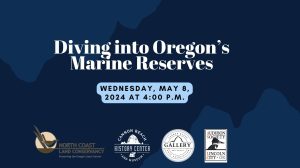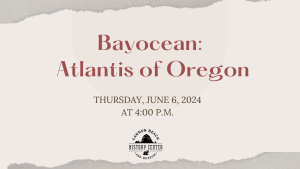
John Williams Lecture Series
Lectures at Cannon Beach History Center & Museum
Lectures occur each month from February through June. Lectures take place in the History Center’s John Williams Classroom. Seating for lectures are limited. Complimentary refreshments are provided. Lectures are FREE, but donations are gladly accepted.
The lecture series includes FREE programs presented by experts on a variety of topics. Typically, lectures are about one hour, and include some face-to-face time with acclaimed authors, professors, and researchers on historical, artistic, and cultural topics.
2024 John Williams Lecture Series Schedule:
Diving into Oregon’s Marine Reserves – Wednesday, May 8, 2024 at 4:00 p.m.

On Wednesday, May 8, 2024, at 4:00 p.m., join the Cannon Beach History Center & Museum and the North Coast Land Conservancy as they welcome Dr. Lindsay Aylesworth with ODFW’s Marine Reserve Program. Lindsay will be presenting cool research results from monitoring in our near shore waters, and where the program is heading with the passing of House Bill 4132 in the most recent legislative session. Following Lindsay’s presentation, attendees are invited to stop by the Cannon Beach Gallery to view their latest art exhibit, “The Reserve Inspiration” featuring artwork that is inspired by the beauty and diversity of Oregon’s five Marine Reserves.
Lindsay is the Marine Reserves Program Leader, with the Oregon Department of Fish and Wildlife based in Newport, OR. Lindsay has been with the marine reserves program for the last 7 years, first as ecological project leader and now as the program leader. She has worked for over 16 years at the interface of science, policy, and marine resource management issues. Prior to coming to ODFW, Lindsay worked on a variety of marine issues including international policy and trade of marine species, bycatch in Pacific Island fisheries, endangered species research, and coral reef ecology. Lindsay received her doctoral degree from the University of British Columbia, where she studied data-poor marine species in Southeast Asia. She has a Master’s degree in coastal environmental management from Duke University, and served as a Fulbright Scholar in Brazil.
This event is free and open to the public and will be held at the Cannon Beach History Center & Museum, located at 1387 South Spruce Street, Cannon Beach, OR. Seating for this event is at a limited capacity of 50 people. This lecture starts promptly at 4:00 p.m. on Wednesday, May 8, 2024. Parking for this event is extremely limited and it is encouraged to arrive early to find parking. This event is in partnership with North Coast Land Conservancy, Audubon Society of Lincoln City, and the Cannon Beach Gallery. For more info about NCLC, visit https://nclctrust.org, for more info about the Audubon Society of Lincoln City, visit https://www.lincolncityaudubon.org/, and for info about the Cannon Beach Gallery, visit https://www.cannonbeacharts.org/. For further information about this event, visit www.cbhistory.org or call 503-436-9301.
Bayocean: Atlantis of Oregon – Thursday, June 6, 2024 at 4:00 p.m.

Join the Cannon Beach History Center & Museum on Thursday, June 6, 2024, at 4:00 p.m. for their last lecture of the season as they welcome Oregon author, Jerry Sutherland. Jerry will be discussing his latest book, Bayocean: Atlantis of the Ocean which focuses on the Oregon resort town that fell into the Pacific Ocean. Like Plato’s fictional island kingdom, most of Bayocean sank below the sea long ago. The rest lies buried beneath the shore pine, salal, and beach grass covering the four-mile-long spit that protects Tillamook Bay from the Pacific Ocean. His book chronicles the half-century the Oregon resort town existed, tells the stories of the people involved, and explains its financial and physical demise. Fifty-seven maps, photographs, and diagrams help readers visualize this unique catastrophe.
Jerry Sutherland began researching Oregon history in 2012 after his father (Art) asked him to look up something about Calvin Tibbets at the Oregon Historical Society. The thrill he experienced in discovering new information about historical events and people led to future visits, trips to archives across the United States and Canada, and the publishing of Calvin Tibbets: Oregon’s First Pioneer in August 2016.
In the fall of 2014, Sutherland learned that Bayocean—the sandspit that separates Tillamook Bay from the Pacific Ocean—had once hosted a thriving resort. His surprise at having never seen any evidence of its existence while hiking there prompted him to learn more. He created www.bayocean.net to share some of what he was discovering with the public. When Grant McOmie took notice in the summer of 2015, he asked for help with a Grant’s Getaway program about Bayocean. Four years later, Jule Gilfillan consulted him regarding an Oregon Field Guide special. Increasing interest from book publishers prompted Sutherland to start writing Bayocean: Atlantis of Oregon in 2019. It was published in February 2023. Signed books will be available for purchase.
This event is free and open to the public and will be held at the Cannon Beach History Center & Museum, located at 1387 South Spruce Street, Cannon Beach, OR. Seating for this event is at a limited capacity of 50 people. This lecture starts promptly at 4:00 p.m. on Thursday, June 6, 2024. Parking for this event is extremely limited and it is encouraged to arrive early to find parking. This lecture is part of the Cannon Beach History Center and Museum’s annual John Williams Lecture Series that occurs every February through June. For further information about this event, visit www.cbhistory.org or call 503-436-9301.
